
READ BEFORE USE
PLEASE KEEP THESE INSTRUCTIONS FOR FURTHER REFERENCE
Original User’s Instructions
2x18V 40cm Brushless Cordless
Lawn Mower
SKU: 23984

2
www.coreservice.co.uk
Hotline: +44 01904 947568
Email [email protected]
CONTENT
∫ WHAT’S IN THE BOX ---------------------------------------------------------- 3
∫ SPECIFICATIONS -------------------------------------------------------------- 4
∫ EXPLANATIONS AND SYMBOLS, CAUTIONS AND WARNINGS ---------- 5
∫ IMPORTANT SAFETY WARNINGS -------------------------------------------- 7
∫ PRODUCT DESCRIPTION AND IDENTIFICATIONS ------------------------ 16
∫ ASSEMBLY AND OPERATING INSTRUCTIONS -----------------------------17
∫ CARE AND CLEANING ------------------------------------------------------- 27
∫ TROUBLE SHOOTING -------------------------------------------------------- 30
∫ DECLARATION OF CONFORMITY / PERFORMANCE -------------------- 31
∫ ENVIRONMENTAL INFORMATION ------------------------------------------32
∫ GUARANTEE -------------------------------------------------------------------33
∫ CUSTOMER SUPPORT ------------------------------------------------------- 33

3
www.coreservice.co.uk
Hotline: +44 01904 947568
Email [email protected]
WHAT'S IN THE BOX
If you do not have all these items, please contact:
www.coreservice.co.uk
Hotline: +44 01904 947568
Email [email protected]
Lawn mower with upper handle
Grass collection bag
ChargerBattery pack x 2
Lower handle
quick release
lever x 2
Teeth clamp
x 2
Upper handle
quick release
lever (curved
bolt head) x 2
Cable clip
x 2
Lower handle

4
www.coreservice.co.uk
Hotline: +44 01904 947568
Email [email protected]
SPECIFICATION
Technical Data
Model Y0J-SP03-4036ZA
Nominal voltage of product with battery 36V d.c. (2X18V 4AH)
No-load cutting speed 3400/min
Cutting width 40cm
Cutting height 25-75mm, 7 positions
Capacity of grass bag 45L
Net weight approx. 13.4kg
Measured sound pressure level(LpA) 79.1dB(A), K=3dB(A)
Measured sound power level(LwA)94.62dB(A), K=1.14dB(A)
Guaranteed sound power level 96dB(A)
Vibrations 1.89m/s² K=1.5m/s²
Battery pack model B0P-SP06-18ZK
Battery capacity 4.0Ah
Battery charging time Max. 120min
Battery charger model B0Q-SP07-2040ZB
Battery charger input 220-240V~, 50/60Hz 120W
Battery charger output 21V d.c. 4A
Protection class Class II /
Note: The above specifications are the MAXIMUM capacities of the tool. Voltage measured
without workload. Initial battery voltage reaches 20 Volts. Nominal voltage is 18 Volts.

5
www.coreservice.co.uk
Hotline: +44 01904 947568
Email [email protected]
EXPLANATIONS AND SYMBOLS, CAUTIONS AND WARNINGS
To reduce the risk of injury, the user must read the instruction manual carefully.
Avoid using the machine in the rain.
Wait until all machine components have completely stopped before touching them.
Keep bystanders away. Objects thrown by the product could hit the user or other
bystanders. Always ensure that other people and pets remain at a safe distance from
the product when it is in operation.
Beware of sharp blades. Blades continue to rotate after the motor is switched off.
Remove disabling device before performing any maintenance tasks.
96
Guaranteed sound power level value is 96 dB.
Wear ear protection, eye protection and protective gloves (PPE) when using the
product.
UK conformity assessed

6
www.coreservice.co.uk
Hotline: +44 01904 947568
Email [email protected]
WEEE symbol. Waste electrical products should not be disposed of with household
waste. Please recycle where facilities exist. Check with your local authority or local
store for recycling guidelines.
The product complies with the applicable European directives and an evaluation
method of conformity for these directives was done.
Do not throw into water.
Do not throw on fire.
Do not subject the battery to strong sunlight over long periods of time. Do not leave
on a heater (max. 45°C).
Batteries contain Li-ion. Do not dispose of waste batteries in domestic waste.
Contact local authority to find out how to dispose of batteries.
The charger is for indoor use only.
Double insulation.
T
5
A
Protective 5A limited.

7
www.coreservice.co.uk
Hotline: +44 01904 947568
Email [email protected]
IMPORTANT SAFETY WARNINGS
General Safety Instructions
Warning: Please read the following instructions carefully,
failure to do so could lead to serious personal injury. When
using the electric lawnmower, basic safety precautions,
including the following, should always be followed to reduce
the risk of fire,electric shock and personal injury. Read all
these instructions before operating this product and save
these instructions.
Become familiar with the owner’s manual before attempting
to operate this machine.
• This appliance is not intended for use by persons (including
children) with reduced physical, sensory or mental capabilities,
or lack of experience and knowledge, unless they have been
given supervision or instruction concerning use of the appliance
by a person responsible for their safety.
• Children should be supervised to ensure that they do not play
with the appliance.
• The appliance is only to be used with the power supply unit
provided with the appliance.
Important! Read carefully before use, keep for further reference.

8
www.coreservice.co.uk
Hotline: +44 01904 947568
Email [email protected]
Training
• Read the instructions carefully. Be familiar with the controls and
the proper use of the equipment.
• Never allow children or people unfamiliar with these instructions
to use the lawnmower. Local regulations can restrict the age of
the operator.
• Never mow while people, especially children, or pets are
nearby.
• Keep in mind that the operator or user is responsible for
accidents or hazards occurring to other people or their property.
Preparation
• While mowing, always wear substantial footwear and long
trousers. Do not operate the equipment when barefoot or
wearing open sandals.
• Thoroughly inspect the area where the equipment is to be used
and remove all objects which can be thrown by the machine.
• Before using, always visually inspect to see that the blades,
blade bolts and cutter assembly are not worn or damaged.
Replace worn or damaged blades and bolts in sets to preserve
balance. Replace damaged and unreadable labels.
• Ensure the switch is in the off position before inserting the
battery pack. Inserting the battery pack into a machine that is
switched on can result in injury.
Product Safety Warnings
General Operation
• Use the tool only with specifically designated battery packs.
Use of any other battery packs will increase the risk of injury
and fire.

9
www.coreservice.co.uk
Hotline: +44 01904 947568
Email [email protected]
• Only operate the product in daylight or in good artificial light.
• Do not expose tool and charger to rain or wet conditions. If a
tool or charger is exposed to moisture it will increase the risk of
electric shock, battery damage, fire or explosion.
• Avoid operating the product on wet grass.
• Always be sure of your footing on slopes.
• Walk, never run.
• Mow across the face of slopes, never up and down.
• Exercise extreme caution when changing direction on slopes.
• Do not mow excessively steep slopes.
• Use extreme caution when reversing or pulling the product
towards you.
• Stop the blades if the product has to be tilted for transportation,
when crossing surfaces other than grass and when transporting
the product to and from the area to be mowed.
• Never operate the product with defective guards or shields
or without safety devices in place such as deflectors or grass
collection bag. When switching on motor keep feet well away
from blades.
• Do not tilt the product when switching on the motor, except if
the product has to be tilted for starting. In this case, do not tilt
it more than absolutely necessary and lift only the part furthest
away from the operator.
• Do not start the product when standing in front of the discharge
opening.
• Do not put hands or feet near or under rotating parts.
• Keep clear of the discharge opening at all times.
• Do not transport the product while the cutting blade is running.

10
www.coreservice.co.uk
Hotline: +44 01904 947568
Email [email protected]
• Stop the product and remove the safety key/battery pack from
the machine and make sure that all moving parts have come to
a complete stop:
∂ Whenever you leave the product unattended.
∂ Before clearing blockages or unclogging chute.
∂ Before checking, cleaning or working on the product.
∂ After striking a foreign object. Make sure to inspect the
product for damage and make repairs before restarting and
operating the product.
• If the product starts to vibrate abnormally:
∂ Inspect for any damages.
∂ Replace or repair any damaged parts.
∂ Check for and tighten any loose parts.
Safety Warning For Battery Pack
• Fully charge battery pack before the first use.
• Recharge battery pack when the power output starts to slow.
Do not continue to use product when battery capacity level is
low.
• To prevent serious damage to the battery pack, charge in
temperatures above 5°C or below 45°C. Longest life and best
performance can be achieved when battery is charged at room
temperature (20 °C ± 5 °C).
• If the battery temperature is hot after use, it must be allowed to
cool before putting it into the charging station.
• If the battery pack becomes too hot during charging, disconnect
and switch off immediately. Contact the service center directly.
• Do not dismantle, open or shred cells or battery pack.

11
www.coreservice.co.uk
Hotline: +44 01904 947568
Email [email protected]
• Do not short-circuit a battery pack. Do not store battery
packs haphazardly in a box or drawer where they may short-
circuit each other or be short-circuited by conductive materials.
When battery pack is not in use, keep it away from other
metal objects, like paper clips, coins, keys, nails, screws
or other small metal objects, that can make a connection
from one terminal to another. Shorting the battery terminals
together may cause burns or a fire.
• Do not carry individual battery packs in your pockets or bag as
they could short-circuit against other metal items.
• Do not expose battery pack to heat or fire. Avoid use or storage
in direct sunlight for extended periods of time.
• Do not subject battery pack to mechanical shock.
• In the event of battery leaking, do not allow the liquid to come
into contact with the skin or eyes. If contact has been made,
wash the affected area with copious amounts of water and seek
medical advice.
• Should a Li-ion battery catch fire, ensure to use the correct fire
extinguisher to combat the fire. Do not throw or spray water on
a burning Li-ion battery.
• Keep battery pack clean and dry. Wipe the battery pack
terminals with a clean dry cloth if they become dirty.
• Battery pack needs to be charged before use. Always refer to
this instruction and use the correct charging procedure.
• Do not maintain battery pack on charge when not in use.
• After extended periods of storage, it may be necessary to
charge and discharge the battery pack several times to obtain
maximum performance.
• Battery pack gives its best performance when it is operated at
normal room temperature (20 °C ± 5 °C).
• When disposing of battery packs, keep battery packs of
different electrochemical systems separate from each other.

12
www.coreservice.co.uk
Hotline: +44 01904 947568
Email [email protected]
• Recharge only with the charger specified by manufacturer. Do
not use any charger other than that specifically provided for use
with the equipment. A charger that is suitable for one type of
battery pack may create a risk of fire when used with another
battery pack.
• Do not use any battery pack which is not designed for use with
the equipment.
• Keep battery pack out of the reach of children.
• Retain the original product literature for future reference.
• Remove the battery from the equipment when not in use.
• Dispose of properly.
• Do not mix cells of different manufacture, capacity, size or type
within a device.
• Do not remove battery pack from its original packaging until
required for use.
Safety Warning For Battery Charger
• Charge only battery pack of the same model provided by
manufacturer and of models recommended by manufacturer.
• Do not use the original charger on other Li-ion batteries or on
any other type of battery as this can increase the risk of fi e or
explosion.
• Check the battery charger, cable and plug before each use.
Do not use the battery charger if damaged. Do not open the
battery charger yourself, charger must be repaired by qualified
personnel using original spare parts.
• The charger is designed to use a standard household 220-240
V~ 50Hz power source, ensure that the plug matches the outlet.
• Never modify the plug in any way, this will reduce the risk of
electric shock.

13
www.coreservice.co.uk
Hotline: +44 01904 947568
Email [email protected]
• Do not abuse the cord of charger. Never use the cord for
carrying, pulling or unplugging the charger. Keep cord away
from heat, oil, sharp edges or moving parts. Damaged or
entangled cords increase the risk of electric shock.
• Make sure the charger cord is situated so that it will not be
stepped on, tripped over or get damaged.
• If the supply cord is damaged, it must be replaced by the
manufacturer, its service agent or similarly qualified persons in
order to avoid a hazard.
• Keep the battery charger clean. Contamination can increase the
risk of electric shock.
• Protect the battery charger from rain and moisture. If water
accesses the battery charger there is an increased risk of
electric shock.
• Battery will heat up whilst charging. When charging batteries,
ensure that the battery charger is in a well-ventilated area and
to reduce the risk of fire, do not operate battery charger on or
close to inflammable materials such as paper or textiles.
• Do not overcharge any batteries. Ensure that batteries and
chargers are not left unsupervised during charging.
• The temperature range over which the battery pack can be
charged is typically between 5°C-45°C. Attempts to charge out
with the prescribed temperature range may automatically be
blocked by the protection circuitry of the battery pack. Longest
life and best performance can be obtained if the battery pack is
charged at room temperature.
• Disconnect charger from the power supply when not in use.
This will reduce the risk of electric shock or damage to the
charger.

14
www.coreservice.co.uk
Hotline: +44 01904 947568
Email [email protected]
• This charger can be used by children aged from 8 years and
above and persons with reduced physical, sensory or mental
capabilities or lack of experience and knowledge if they have
been given supervision or instruction concerning use of the
appliance in a safe way and understand the hazards involved.
• Children shall not play with the appliance. Cleaning and user
maintenance shall not be made by children without supervision.
Maintenance and Storage
• Always allow the product to cool down before storing.
Disconnect the machine from the power supply (e.g., remove
the battery pack from the machine) before carrying out
maintenance or cleaning work.
• Keep all nuts, bolts and screws tight to be sure the product is in
a safe working condition.
• Check the grass collector frequently for wear or deterioration.
• Be careful when adjusting the product to prevent trapping
fingers between moving blades or other fixed parts of the
product.
• When servicing the blades be aware that even though the
power source is switched off, the blades can still move.
• Replace worn or damaged parts for safety. Use only genuine
replacement parts and accessories.
• Do not attempt to open the charger and battery pack. There are
no customer serviceable parts inside. Return to any authorized
service center.
• Store the appliance with battery pack fully charged at room
temperature. When not in use, store the machine out of the
reach of children.

15
www.coreservice.co.uk
Hotline: +44 01904 947568
Email [email protected]
• Every deep discharge cycle decreases the capacity of battery
pack. To prolong battery life, it is recommended that you charge
the battery every six months within extended periods of time
when the product is not in use.
• Have your tool repaired by an authorized service agent. This
tool is manufactured in accordance with the relevant safety
regulations. To avoid danger, equipment must only be repaired
by qualified technicians.
• Only use parts and accessories made for this machine by the
manufacturer. Failure to do so can result in personal injury.

16
www.coreservice.co.uk
Hotline: +44 01904 947568
Email [email protected]
PRODUCT DESCRIPTION AND IDENTIFICATIONS
1
4
5
2
7
8
9
14
15
17
19
20
21
18
16
13
6
12
10
11
3
1. Switch box with on/off button
2. Cable clip x 2
3. Power cord protection sheath
4. Lower handle
5. Grass full indicator
6. Safety flap
7. Carry handle
8. Battery pack compartment cover
9. Front wheel
10. Roller
11. Safety key(in the battery pack
compartment cover)
Not all the accessories illustrated or described are included in standard delivery.
12. Grass comb
13. Battery pack + Charger
14. Cutting height adjustment lever
15. Rear wheel
16. Lower handle quick release lever
17. Grass collection bag
18. Carry handle for grass collection bag
19. Upper handle quick release lever
20. Switch lever
21. Top handle

17
www.coreservice.co.uk
Hotline: +44 01904 947568
Email [email protected]
ASSEMBLY AND OPERATING INSTRUCTIONS
NOTE: To reduce the risk of injury, user must read instruction
manual.
Intended Use
This product is intended for domestic lawn mowing.
WARNING: Before assembly and adjusting to the mower, ensure the
mower is turned off and the battery pack is removed.
WARNING: Ensure the battery pack is disconnected from the mower
before making the assembly.
Attach the lower handle
Attach the two locking cams to the lower handle.

18
www.coreservice.co.uk
Hotline: +44 01904 947568
Email [email protected]
Attach the lower handle to the lawn mower
Mount the locking cams on the lower handle (4) onto the clamp base on the machine. There are 3
angle marking lines on the tooth cams base. Carefully aline the mark arrow on the tooth cams to
the corresponding angle marking line on both sides. The lower handle (4) angle can be adjusted by
aligning the mark arrow to different angle marking lines for desired operation angles.
Insert the lower handle quick release lever (16) bolt into the hole on each side. Rotate the levers
counter clockwise for 5 or 6 times then push the lever onto the lower handle bars to securely locking
the clamps in place.
Attach the top handle to the lawn mower
Loosen the upper handle quick release lever (curved bolt head)(19) separately with locking lever,
gasket and bolt.
Attach the upper handle onto the lower handle from outside of the lower handle and align the holes in
order with locking lever, washer, upper handle and lower handle (4).
Assemble them with the upper handle quick release levers(19). (Refer to figure below)
Lower handle
Bolt
washer
Upper handleUpper handle
quick release
lever

19
www.coreservice.co.uk
Hotline: +44 01904 947568
Email [email protected]
Fitting the cable clip
Ensure that the cable clips(19) supplied are used to fix the cable to the lower handle and upper
handle.
Attach the grass bag
Attach the grass collection bag to the frame by fixing the plastic hooks onto the side.

20
www.coreservice.co.uk
Hotline: +44 01904 947568
Email [email protected]
Lift the safety flap with one hand and hook in the grass collection bag. Release the safety flap to
secure the grass collection bag in position.
BEFORE OPERATION
WARNING: The charger and battery pack are specially designed to work together so
do not attempt to use any other devices. Never insert or allow metallic objects into
your charger or battery pack connections otherwise an electrical failure and hazard
will occur.
NOTE: The battery pack comes partly charged. Charge the battery pack prior to first use, ideally at
least 60 minutes.
• Always pull out the plug of the charger from the mains before removing or connecting the battery
pack to the charger.
• Never charge the battery pack when the ambient temperature is below 5°C or above 45°C.
• Never recharge a battery pack again immediately after rapid charging. This could overcharge the
battery pack, thus reducing the lifespan of the battery pack and charger.
• Rest the charger for at least 15 minutes between continuously charging sessions.
NOTE: Always fully charge the two batteries at the same time.
Page is loading ...
Page is loading ...
Page is loading ...
Page is loading ...
Page is loading ...
Page is loading ...
Page is loading ...
Page is loading ...
Page is loading ...
Page is loading ...
Page is loading ...
Page is loading ...
Page is loading ...
-
 1
1
-
 2
2
-
 3
3
-
 4
4
-
 5
5
-
 6
6
-
 7
7
-
 8
8
-
 9
9
-
 10
10
-
 11
11
-
 12
12
-
 13
13
-
 14
14
-
 15
15
-
 16
16
-
 17
17
-
 18
18
-
 19
19
-
 20
20
-
 21
21
-
 22
22
-
 23
23
-
 24
24
-
 25
25
-
 26
26
-
 27
27
-
 28
28
-
 29
29
-
 30
30
-
 31
31
-
 32
32
-
 33
33
Ask a question and I''ll find the answer in the document
Finding information in a document is now easier with AI
Related papers
-
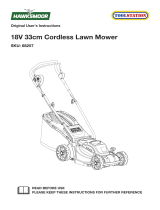 Hawksmoor 68257 Owner's manual
Hawksmoor 68257 Owner's manual
-
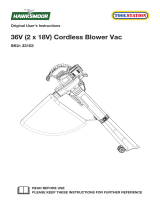 Hawksmoor 33103 Owner's manual
Hawksmoor 33103 Owner's manual
-
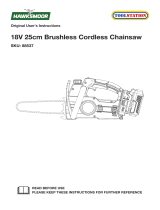 Hawksmoor 88537 Owner's manual
Hawksmoor 88537 Owner's manual
-
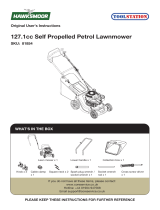 Hawksmoor XSZ40B Owner's manual
Hawksmoor XSZ40B Owner's manual
-
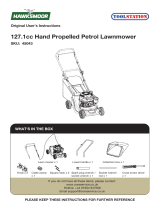 Hawksmoor XSS40B Owner's manual
Hawksmoor XSS40B Owner's manual
-
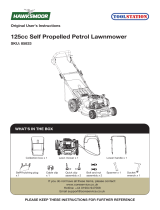 Hawksmoor XSZ46D Owner's manual
Hawksmoor XSZ46D Owner's manual
-
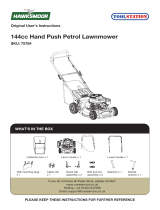 Hawksmoor XSS46F Owner's manual
Hawksmoor XSS46F Owner's manual
-
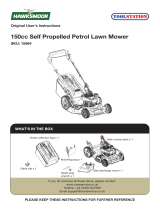 Hawksmoor XSZ53D-SD-E Owner's manual
Hawksmoor XSZ53D-SD-E Owner's manual
-
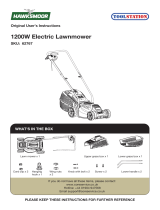 Hawksmoor SLM32F-ZE Owner's manual
Hawksmoor SLM32F-ZE Owner's manual
-
Hawksmoor DT4302 Owner's manual
Other documents
-
Makita LM001G User manual
-
Masport 553220 Owner's manual
-
Gardenline GDLM3640 User manual
-
Gardenline GL3.6GS Owner's manual
-
Simplicity MANUAL, OPERATOR 56V E-RIDE User manual
-
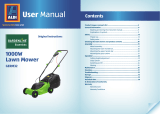 Gardenline Essentials GERM32 SLM32E-ZB Owner's manual
Gardenline Essentials GERM32 SLM32E-ZB Owner's manual
-
Nordic POBA4650 User manual
-
Nordic POBA9795 User manual
-
Ferrex SLM32F-ZE Owner's manual
-
ALDI GLM32F User manual










































